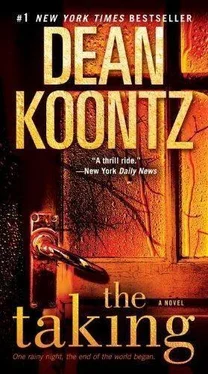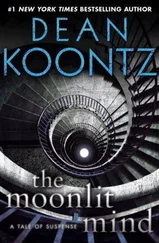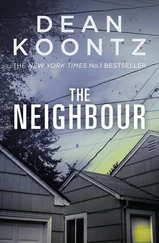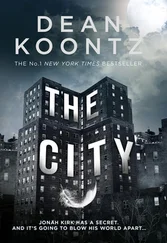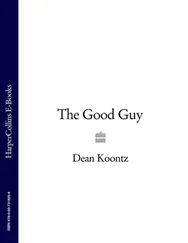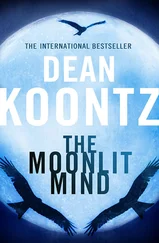Yet when the doll spoke, those onlookers standing nearest to it backed away.
Molly moved closer to Neil.
"Hungry. Eat," the doll repeated.
The mouth was hinged at the corners. When the doll spoke, its lips moved, revealing a small pink tongue.
Still surveying the tavern, the minikin cycled through some of the contents of its phrase bank: "I love you
baby's sleepy
nighty-night
my tummy hurts
diaper wet
Mommy, sing for baby
baby likes your song
I will be good, Mommy
I'm hungry
baby needs pudding
yum-yum, all gone
"
The doll fell silent. Tipping its head back, it gazed at the ceiling, as if it felt the behemoth passing in the rainy night.
Indeed, something in the doll's attitude-the cock of its head, the slight forward lean of its body, the unnerving intensity of its glass eyes-gave rise in Molly to the thought that it was not merely aware of the leviathan above but was also in communion with it.
Lowering its head, shifting its gaze to those in the tavern once more, the doll said, "Diaper
diaper
diaper." Then it dropped the second syllable: "Di
di
di
"
Someone said, "Shut the damn thing up," and someone else said, "Wait, let's see."
"Sing
sing
sing," said the doll, then shortened the word to just the suffix, "
ing
ing
ing." A pause. Then the combined form: "Dying
dying
dying
"
Looking around, Molly saw faces as pale as her own must be.
Lee Ling watched, one fist to her mouth, biting on her knuckles, and her husband, Norman, stood with his shotgun cradled across his arm, as if he wished he could do something with it.
The doll declared, "Dying hurts," and although it had no source of power to facilitate such animation, it raised its right hand to its mouth, as if in imitation of Lee Ling.
The articulated shoulder and elbow joints might have allowed the minikin's arm to bend as it did. Its molded rubber hands were not jointed, however, and should not have been able to commit the self-mutilation that followed.
Reaching between its hinged lips, the doll pinched its pink vinyl tongue and tore it out.
"Dying hurts."
Up went the left hand, which clawed at the left socket, pried out the semispherical eye, and dropped it on the bar, where it bounced, blue and blinkless, along the mahogany, and spent its final energy in a short-lived blind spin.
"All your babies," the doll said, in a cracked cadence that resulted from cobbling words together from various phrases on its voice chip, out of context, "all your babies will die."
"ALL YOUR BABIES WILL DIE."
On the repetition of that threat, Molly looked toward the children gathered at the far side of the room. All were on their feet, craning their necks. She wished that they could be spared this psychological warfare, if that was in fact the purpose of the puppeteer behind this bizarre performance.
The doll sat one-eyed, working a finger of its right hand in the empty socket in the manner of a swimmer trying to drain a water block in an ear.
If wet gray wormlike forms had burst in frenzied wriggling from the gouged socket, Molly would not have been surprised.
"All your babies will die."
The weight of those five words, seemingly a promise of human extinction, pressed as heavily on her as the maximum density of the hovering mystery above Black Lake that, with the rhythmic throb of its engines or its heart, compressed her lungs, oppressed her spirit.
The doll's right hand rose to the right socket, tore loose the second orb. Always sightless since the day of manufacture, it had now double-blinded itself.
"All your babies, your babies, your babies will die."
His choking rage expressed in a throttled curse, Norman Ling stepped to the bar, raising his shotgun.
"Norman, God's sake, no shooting here!" warned Russell Tewkes, the tavern owner.
As the eye fell from the rubbery hand, the sorcery enlivening the figure seemed to subside in power or even to vacate it entirely. The doll sagged, slumped backward on the bar, and lay still, its eyeless gaze turned toward the ceiling, the night, and the gods of the storm.
Pale with fear, hard-faced with anger, Tewkes used one cupped hand to sweep the torn vinyl tongue and the two glass eyes off the bar into a trash can.
As the taverner next reached for the doll, someone cried out, "Russ, behind you!"
Revealing that his nerves were trigger wires, Tewkes turned with snap-quick torque that belied the apparent ponderousness of his beer-barrel body, fisting his hands as if to defend, in classic barroom style, against any looming threat.
At first Molly didn't see what had inspired the warning.
Then Tewkes declared, "That's not going to be me. Like hell it is."
A mirror ran the length of the long bar. Tewkes stared at his reflection, in which the right side of his face was crushed.
In spite of his declaration, half convinced by the testimony of the mirror, Tewkes raised one hand to his face to reassure himself that a catastrophe had not already befallen him. In the reflection, his hand looked twisted, mangled.
Gasps of recognition and thin cries of horror arose from others in the tavern as they realized that Tewkes was not the only one among them whose reflection purported to be a preview of his mortal fate. In the mirror, they saw their friends, saw their neighbors, sought themselves-and in every instance were presented with a cadaver, each the victim of extreme violence.
The lower jaw had been torn from Tucker Madison's face. The deputy's upper teeth bit air.
In reflection, Vince Hoyt's Roman-emperor head lacked the top of its skull, and the phantom Vince pointed out of the mirror, at the real Vince, with an arm that terminated in bristling bone below the elbow.
Here stood a gnarled burnt mass that had once been a man, still smoking, grinning not with humor or menace, but because his teeth had been revealed in dental-chart explicitness when his lips had been seared away.
Molly knew that she shouldn't look for herself in this gruesome mural. If it was a glimpse of unavoidable destiny, it would foster despondency. If it was a lie, the image of her death-corrupted face and body would nevertheless fester in memory, diminishing her will to action, compromising her survival instinct.
Morbid curiosity may be integral to the human genome: In spite of her better judgment, she looked anyway.
In the premonitory mirror, in that other tavern of the standing dead, Molly Sloan did not exist. Where she should have been, there was only vacancy. Behind that vacancy stood the ripped and grisly reflection of the man stationed at her back on this side of the looking glass.
Earlier in the night, in her bedroom vanity mirror, where she had glimpsed a future version of that chamber jungled with vines and mold and fungus, she had seen her reflection; she had not appeared therein as a corpse or in any way distorted, but entirely as she looked in reality.
Now, with dread, she sought Neil's reflection. When she found that he also had no place in that back-bar panorama of animated cadavers, she didn't know whether she should be relieved by their lack of representation or should assume that it meant their fate involved something worse than the decapitation, amputation, and mutilation visited upon the others.
She glanced at him beside her, in the flesh. Their eyes met, and she knew that he had recognized the absence of their reflections and, like her, was confused about the meaning of it.
The lights failed. Absolute darkness flourished.
This time, no doubt, the loss of power would be permanent.
Prepared for this eventuality, eight, then ten, then perhaps twenty of the gathered citizens switched on flashlights. Sabers of light slashed the darkness.
Many of the beams found the mirror, perhaps evidence of a collective fear that the grotesque Others on the far side of the silvered glass had in the blackness stepped through to this world. The dazzle made it impossible to see the current reflection.
Читать дальше
Конец ознакомительного отрывка
Купить книгу
